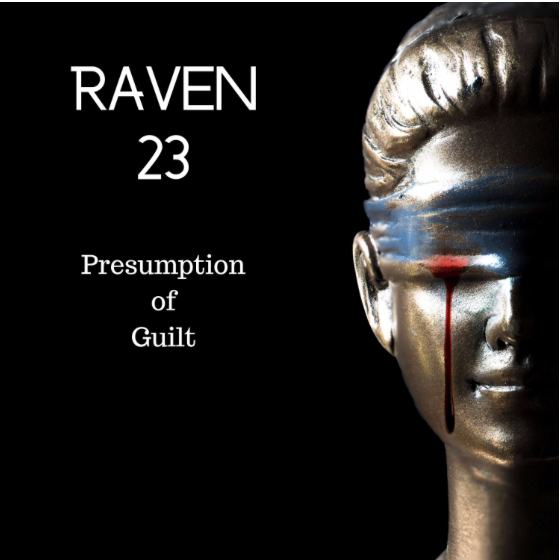There has been an attempt, of sorts, in recent years to rehabilitate the reputation of four men: Evan Liberty, Dustin Heard, Nicolas Slatten, and Paul Slough. Even if you don’t know their names, you may recall the company they worked for – Blackwater Worldwide – and their connection to the 2007 deaths of fourteen Iraqis at Nisour Square in Baghdad. In 2014, after a drawn-out legal proceeding, the four were convicted and sentenced to prison.
Defenders of the foursome have, since their conviction, appeared in media outlets like Fox News or The Daily Mail, along with other, more conservative leaning media outlets like The Blaze Radio Network, The Cato Institute, and the website of former Representative Allen West. They’ve even received support from David French in the pages of National Review. This rehabilitation effort has branched out in recent months in the form of a podcast called Raven 23: A Presumption of Guilt.
Smartphone-enabled podcasts have revived the radio industry and flooded the market with hundreds of thousands of choices. I’m a rabid consumer, listening at every opportunity. It’s a personal medium. Through your earbuds, it speaks directly – and only – to you, blocking out everything and everyone else as you walk to the store or drive to work or sit on a crowded train heading into the city.
Mike Flaherty and Gina Keating, co-producers of the podcast, capitalize on this aspect of the medium. They begin the series not by laying out their version of what happened in Nisour Square, but by reliving 9/11. In the very first episode you’ll hear the planes crash into the Twin Towers, listen as horrified news reporters attempt to describe the events of the day, and take in President Bush speaking through a bullhorn to first responders. If you possess an adult memory of the event, you can’t help but feel your hair stand on end.
It’s incredibly effective.
It’s also entirely irrelevant to the fourteen Iraqis who died in Nisour Square.
To her credit, Keating, the podcast narrator and a former staff reporter for Reuters and United Press International, never pretends at any point in the seven episodes released thus far to be unbiased. She’s an advocate for the convicted, full stop. Her effort is a transparent attempt to persuade President Trump to pardon these four men.
The podcast’s first episode was released in early August, and subsequent episodes have dropped at irregular intervals ever since. The production quality is poor – some reviews simply say “fix the audio” – and the narrative is often inconsistent or contradictory from one episode to the next. A high ranking Iraqi Policeman, for example, is “believed” to have insurgent ties in the first episode that have apparently been “proven” by the fifth, with no explanation in between.
Six minutes into the first episode she describes the story of Raven 23 – callsign of the Blackwater unit to which Liberty, Heard, Slatten and Slough were assigned – as “a real-life horror story about four highly decorated military veterans accused of a crime they didn’t commit. It’s about a Justice Department more interested in wins and losses than truth and justice.” This quickly turns into a theme. Charges of lying and corruption and witness tampering and much more are strewn about haphazardly without any evidence to support them.
Keating claims to be a liberal atheist, but she plays entirely to the sympathies of the right-wing base. She describes the case as “Orwellian,” blaming government misconduct and overreach. She bats Joe Biden around a bit. The Fake News Media pops up throughout. And she consistently calls the four men “veterans” – which they are – emphasizing the awards and accolades they earned while wearing the uniform, but never quite comes to terms with the fact that, on the 16th of September 2007, not a single one of them was wearing that uniform.
Her attempts to humanize these men in the first few episodes work. They work well. In their voices I hear echos of the soldiers I knew from all across the country and around the world during my two decades on active duty. I feel like I know these four, and their families.
But, I also know Nisour Square. In 2007 I was the Iraqi Security Forces Coordinator for the 2nd Brigade, 1st Cavalry Division. I lived and worked with the 2nd Iraqi National Police Brigade on a compound outside the wire about a mile from Nisour Square. This unit was one of the first responders on the scene after it happened. They recorded video of the scene that they showed me upon their return. I passed through Nisour Square several times a week on my way to the Green Zone for meetings and know the area and its surroundings quite well. And I do not believe Raven 23 was ambushed by insurgents that day.
Years ago, following the 2014 conviction, I wrote a piece for Liberty Island describing why I think the jury made the right decision. That argument, in short, has four parts. First, the Karkh District in general and Nisour Square in particular were peaceful in September of 2007. Second, Blackwater with their well-earned reputation for aggressive and unnecessary use of force, operated outside the military structure set up in the Baghdad Security Plan of 2007. Third, they could have accomplished their mission through coordination with the US Military or the Iraqi Security Forces, but chose instead to go it alone, thus creating the conditions for the incident. Finally, I argued that if the Blackwater contractors were shot at, it was by an Iraqi Policeman trying to get them to stop firing at civilians.
If I’ve learned anything from Keating and the Raven 23 podcast, it’s that I gave short shrift to my fourth argument. In 2014, I wasn’t convinced anyone had fired in the direction of Raven 23. But, after listening to the stories of the men who were there that day, I do think they received incoming rounds.
In the seventh and latest episode of the podcast, we hear from Nick Polous, the Blackwater senior leader who ordered Raven 23’s commander to stay in the Green Zone and not drive out to Nisour Square. He says the following:
“Did the Iraqi Police or Iraqi Army or whoever the hell was in that intersection decide to shoot at [Raven 23] first, there’s no doubt in my mind. Why? Well, [Raven 23 had] just saw a vehicle they believed to be a VBIED and they shot at it and blew it up, in essence, and maybe some Iraqi Policemen or some other dude with a gun, somebody starts shooting at [Raven 23] and that starts the whole thing.”
Keating chooses not to comment on Polous’s account or frame it in any way. The fact that she chose to include it at all is baffling because, if what Polous says is true – and I think it’s as close to the truth as we’ll ever come – it sinks her case for a pardon.
Imagine, if you will, a group of armored vehicles stops traffic at a busy intersection outside the Police Station in downtown St. Lous, Missouri. Those drivers caught in the traffic jam are undoubtedly perturbed. Horns blare incessantly. People begin to search for avenues of escape. Moving. Jockeying for position.
Then imagine that one of the men atop those armored vehicles, armed with an automatic weapon, decides to interpret that movement as a threat. There are a million white Toyota Corolla’s on the road in St. Louis, and he’s heard one of them might have a bomb in it. In response, and in full view of the policemen standing outside the station, he shoots into the vehicle, killing the driver.
Would you expect those policemen to fire at him?
I would.
Keating repeatedly notes that insurgents were known to wear Iraqi police uniforms, which were on sale at various markets throughout the city. You know what else Iranian-backed militia groups were known to wear in 2007?
American uniforms.
In January 2007, an Iranian-backed group wearing US Army uniforms gained entry to the Provincial Joint Coordination Center in Karbala, south of Baghdad. They killed the American soldiers guarding the center then captured several of the soldiers working inside. After Iraqi police gave chase, the group ditched their American-made SUVs, shed their American uniforms, and executed the soldiers they’d captured.
Here’s Keating again, describing the events of 16 September 2007:
“The white KIA kept rolling toward the convoy. Four of the seven turret gunners, Dustin Heard, Paul Slough, Donald Ball, and Jeremy Ridgeway lit into the vehicle with their machine guns. Ridgeway later testified that he shot Mahasan and kept firing at vehicles behind the KIA. Tommy Vargas, the vehicle commander, noticed immediately that his front turret gunner, Ridgeway, was firing wildly into the KIA and down the road at a couple of men standing behind the white car. Matt Murphy, in the second vehicle, testified that Ridgeway was picking out targets and continued shooting down the road. Vargas called up to Ridgeway in the turret…’ I told him cease fucking firing and I elbowed him in his fucking kneecap.”
The people inside the white KIA were, of course innocent. They were never a threat. If the Iraqi policemen scattered throughout Nisour Square chose to fire on the Blackwater contractors – and I believe they did – it was a justified response to witnessing civilians gunned down in the street. To the extent there was a “firefight” (Keating presents witness testimony that one of the vehicles was marked with grand total of five bullet strikes. One of the vehicles was disabled, but that may have been caused by Blackwater’s own grenades.) it was entirely the fault of Raven 23.
Had they stayed in the Green Zone, or had one guy simply walked over to the Iraqi Traffic Police and asked him for help, fourteen Iraqis would not have perished that day. There was no car bomb. There were no insurgents waiting to strike at the next American convoy traveling through the Square. The events of that day were, and remain, in every respect, tragic.
In 2014, I believed the jury’s verdict to be just, and neither Keating nor her podcast have changed my mind. After all the aspersions and innuendo are swept away, fourteen Iraqis are still dead and she’s presented no evidence that anyone other than Blackwater contractors are responsible. Her sentence structure, by the way, turns curiously passive when she speaks of the dead. They “were killed,” she says in passing, as if by accident.
No, killing is an active endeavor. Someone does it, and our justice system is designed to hold that someone responsible. It’s not always perfect, our system, but in this case they got it right.
Mike Flaherty and Gina Keating and the Raven 23 podcast get it all wrong.



Comments
Leave a Reply